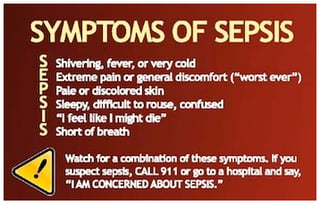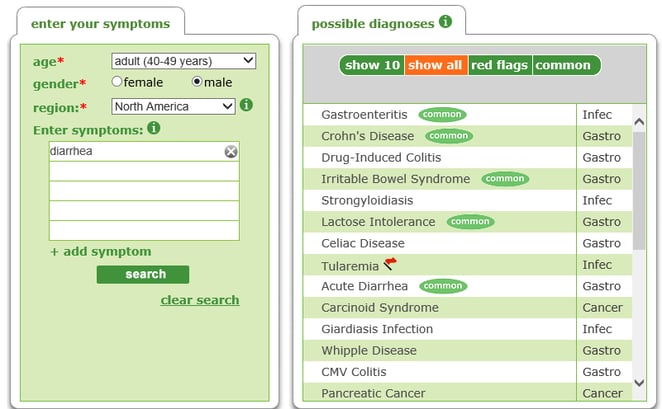- Privacy Policy
- Terms & Conditions
- Contact us
- ©Isabel Healthcare 2025
1 Minute Read | Symptom Information | Diarrhea or Diarrhoea
 Diarrhea, also spelt diarrhoea, is an increased frequency of bowel movements consisting of abnormally loose or watery stools. The condition can range from an hour to several weeks depending on the severity and cause of the condition, and it is often associated with other illnesses such as vomiting or viral infections. Diarrhea is one of the most common reasons for which people seek medical advice, and is often a symptom people notice first for more serious illnesses. It’s unpleasant, often painful, and very tiring. It can also be very debilitating if it continues for a long time, as makes you feel you can’t go too far away from your house or somewhere that has easy access to a toilet.
Diarrhea, also spelt diarrhoea, is an increased frequency of bowel movements consisting of abnormally loose or watery stools. The condition can range from an hour to several weeks depending on the severity and cause of the condition, and it is often associated with other illnesses such as vomiting or viral infections. Diarrhea is one of the most common reasons for which people seek medical advice, and is often a symptom people notice first for more serious illnesses. It’s unpleasant, often painful, and very tiring. It can also be very debilitating if it continues for a long time, as makes you feel you can’t go too far away from your house or somewhere that has easy access to a toilet.
Figures estimate that globally there are 1.5 billion cases of diarrheal disease every year, and 1.9 million children below the age of 5 years (mostly in developing countries) die annually from complications of diarrhea, mostly in developing countries where treatment is unavailable. The main cause of serious illness stemming from diarrhea is dehydration. If someone is unable to take in enough water or liquid to counteract those being lost through watery stool, the body becomes deprived of the fluids it needs to function properly. This can lead to problems with the kidneys, liver, bladder and even the heart or brain in extreme cases. For this reason it’s so important to know how serious your case of diarrhea is, and how to spot symptoms of dehydration and act fast.
What is Diarrhea?
Diarrhea is defined by the length of time the condition lasts, and is known as either: acute diarrhea, lasting between a few a hours and two weeks; persistent diarrhea, which lasts between two and four weeks; or chronic diarrhea, which lasts longer than four weeks and is usually associated with a much more serious underlying condition. All cases have some similar symptoms, however:
- Loose watery stools
- Stomach pain
- Stomach cramps
- Thirst
- Weight loss
- Fever
Acute diarrhea causes and diagnosis
World Health Organization guidelines state that acute diarrhea is the presence of 3 or more abnormally loose or watery stools in the preceding 24 hours. Acute diarrhea can also be bloody and this is known as dysentery. The most common cause of acute diarrhea worldwide is infectious, and results from viruses, bacteria and parasites. Most cases are acquired through the fecal-oral route from contaminated water or food. The majority of the cases of acute infectious gastroenteritis are viral and therefore tend to resolve within a few days. Bacterial infections which can be seen are:
Escherichia coli – most common cause of diarrhea in developing countries and usually occurs in epidemics in the summer season. The bacteria is caused by ingesting undercooked meat, apple cider, lettuce, cheese and milk. It is most common in the very young or elderly.
Campylobacter – Acquired from undercooked poultry in developed countries and is the second most common documented foodborne disease. The diarrhea can be watery or bloody and is associated with crampy abdominal pain.
Salmonella – Leading cause of foodborne disease in developed countries. It is associated with ingestion of poultry, eggs and milk products.
Clostridium difficile – The most common hospital acquired infection and is a frequent cause of morbidity and mortality in the elderly.
Other causes of acute diarrhea include Yersinia, Shigella, Aeromonas, Listeria, Staphylococcus aureus, Clostridium perfringens and Vibrio Cholerae.
Almost all cases of acute diarrhea clear up by themselves, especially if an underlying infection is the cause and is treated, so most of the time no direct treatment is required. However, in some cases, stool samples may be taken and sent for microscopy to look for parasites or eggs, and a bacterial sample taken to look for white blood cells which could indicate infection. If you have recently had antibiotics, then a test for Clostridium difficile may also be done. Blood tests of a full blood count plus electrolytes may also be taken to see if you are dehydrated.
Persistent and chronic diarrhea causes and diagnosis
If the length of diarrhea is longer than two weeks, acute diarrhea causes will have been ruled out, and so the Doctor will then look for other causes of the chronic diarrhea. These can include:
Inflammatory bowel disease (ulcerative colitis, crohn colitis) – inflammation of the intestines
Ischemic colitis – inflammatory condition of the colon where there isn’t enough blood flow to the colon
Cancer
Celiac disease – autoimmune disease where ingestion of gluten leads to small intestine damage
Small bowel bacterial overgrowth – excessive bacterial overgrowth in the small intestine leads to symptoms developing including abdominal pain and diarrhea
Tropical sprue
Lymphoma
Irritable bowel syndrome – long term condition causing bouts of abdominal pain, diarrhea and abdominal bloating
Infective gastroenteritis

Isabel symptom checker and causes of diarrhea
Certain tests can be done to diagnose the cause of persistent or chronic diarrhea. These could include a full blood count to test for anemia, celiac disease tests, and liver or thyroid function tests. Other tests may be done to check for various malabsorptions, like calcium, vitamin B12, or iron.
How do i know if I’m dehydrated?
As mentioned above, complications from diarrhea normally arise due to dehydration. Therefore, it is important to drink plenty of fluids when you have diarrhea and look for these symptoms of dehydration, in both children and adults.
Infants
- dry skin or dry lips
- soft spot on top of the baby’s head called the fontanelle is sunken (dipped in)
- lack of wet nappies
- sunken eyes
- no tears when crying
- dark yellow or brown urine
- rapid breathing
- cold skin, hands and feet
- lethargy or drowsiness
Children and Adults
- dry and cracked lips
- dry mouth
- decrease in urine output or no urine output for 8 to 12 hours
- dark coloured urine
- Drowsiness
- irritability
- cold skin
- low energy levels – weak or limp
- thirst
- dry skin – when the skin is pinched it doesn’t bounce back to what it was easily
How can I help my doctor?
If you are concerned about your diarrhea, or it has lasted for longer than two weeks, run your symptoms through Isabel Symptom Checker and book an appointment with your doctor to discuss the findings. Before your consultation, think about the following questions they may ask you:
- Describe your diarrhea (stool frequency, consistency, colour, smell)
- How long have you had the diarrhea?
- Have you taken any medications recently?
- Have you been abroad recently?
- Do you have any of symptoms besides the diarrhea?
- Have you been around anyone else who has diarrhea?
When is it an emergency?
You should call your doctor straight away if you experience any of the following:
- Dehydration symptoms as above
- Signs of toxicity including tachycardia (rapid heart rate), pyrexia (very high fever), cold hands and feet or hypotension
- Severe abdominal pain
- Rectal bleeding
- Dramatic weight loss

Mandy Tomlinson
Mandy has worked for Isabel Healthcare since 2000. Prior to this, she was a Senior Staff Nurse on the Pediatric Infectious disease ward and high dependency unit at one of London's top hospitals, St Mary’s in Paddington which is part of Imperial College Healthcare NHS Trust. Her experience in the healthcare industry for the past 33 years in both the UK and USA means she's a vital resource for our organization. Mandy currently lives and works in Scottsdale, Arizona.
Subscribe Here!
Recent Posts
Isabel DDx Companion with ChatGPT Integration - to help you diagnose even faster
At Isabel Healthcare, we’ve always been driven by one goal: to make clinical reasoning faster,..Virtual Triage: Do more questions lead to better patient outcomes?
One of the common misconceptions related to virtual triage / symptom checker tools is that the more..List Of Categories
- Differential Diagnosis Decision Support
- Differential diagnosis
- Symptom Checker
- Symptoms
- Medical Error
- Patient Disease Information
- Disease
- Clinical Decision Support
- Diagnostic Decision Support
- Isabel 1 Minute Read
- Diagnosis Error
- Diagnosis Skills Cases
- Healthcare Informatics
- Clinical Reasoning
- Evidence-based Medicine
- Medical Education
- Patient Engagement
- Symptom Triage
- Nurse Practitioner Education
- Nursing Decision Support
- Partnership
- Public Health
- COVID-19
- EHR
- Patient Empowerment
- Patient Safety
- rare disease

Start your FREE Trial today
Try the Isabel Pro DDx generator for 30-days - no payment card details required.



